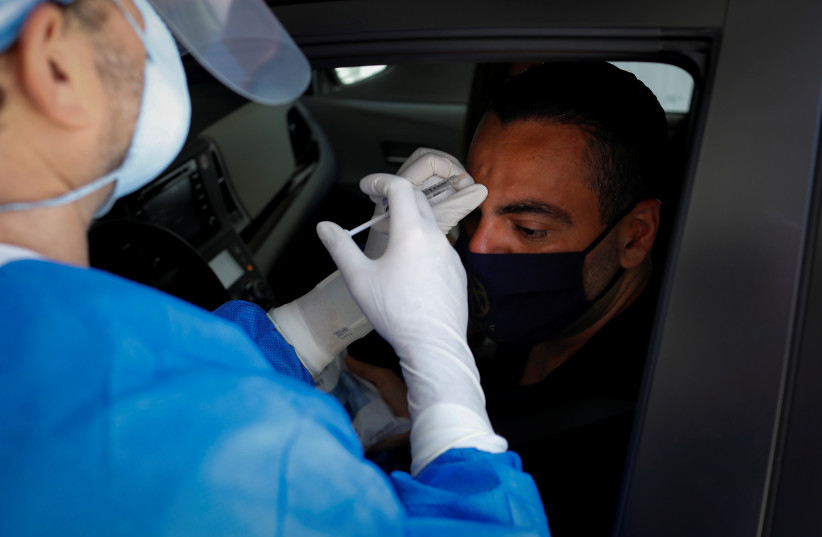Dr. Mona Atamna Alimi, originally a dentist, started practicing aesthetic medicine five years ago because she felt that facial cosmetics should be treated with the frequency and seriousness it deserves.
"I studied cosmetology and chemical cosmetics for two years. Now, I can diagnose problems and identify solutions," said Alimi.
"When a patient comes to me I check if and what creams she uses, and with my extensive experience in medicine, I offer suitable solutions," she added.
Alimi sees patients in Kfar Qara, Rosh HaAyin and at Elnor Hospital in Umm al-Fahm.
What is botox?

Botox is a substance extracted from botulinum toxin, which was discovered in 1895 and has since been used worldwide for medical and aesthetic purposes.
Botox injection eliminates the nerve stimulation in the area and causes relaxation of the expressive muscles which cause wrinkles, and blurs existing wrinkles. It’s a protein that is foreign to the body, and, according to data, 5% of all patients will develop antibodies to the injection and won’t see an immediate effect. The condition may change after re-injection several weeks later.
Botox treatments have now become the most convenient and fastest way to maintain a youthful appearance. Days after a treatment that lasts only a few minutes and is barely felt, long-term results can already be seen. The effect of the treatment usually lasts between four and six months.
<br>Why inject botox?
Botox is injected mainly to remove wrinkles but it can also be used for other medical problems such as excessive sweating or migraines.
Botox is very effective in reducing/eliminating wrinkles at the sides of the eyes, forehead, the area between the eyebrows and more, and gives a younger look. Injection on the forehead also raises the eyebrows and opens the eyes with a natural, young and fresh look.
It is also used to treat a smile that over-exposes the upper gums and also to treat eyebrows so that they go up symmetrically i.e. at the same time. Also, micro-botox or mizobotox is a gentle, surface injection that treats wrinkles around the mouth and cheek.
<br>Is botox harmful to health?
Definitely not. Botox has been used in general medicine for more than 20 years to treat neurological disorders and visual disturbances. There’s no problem with the substance itself, but it must be administered by a qualified doctor.
<br>How does Botox work?
"This is a simple injection and doesn’t require anesthesia," Alimi said. "The treatment takes a few minutes, the injection isn’t painful and at most stings a bit. Ten days later, an examination is performed because each person reacts differently due to muscle activity. Treatment is repeated within four months or half a year depending on the results.
<br>When will you see your Botox results?
"Within three and ten days you start to see results, which usually reach a peak about two weeks after the injection. The process is gradual and works differently for everyone, but within a few days, you see change. By the way, the treatment doesn’t interfere with any daily activities,” Alimi said.
<br>Who can’t use Botox?
“Women aren’t allowed during pregnancy, though while breastfeeding there are special guidelines to follow. People with neurological diseases are also not allowed to use it.
"The age that is recommended to start injecting Botox varies depending on the genetic data and lifestyle of each person. In recent years, the average age to start treatment has gone down,” she said.
<br>Types of Botox
"There are many brands and I use Dysport, which is considered the best product in the world today. Its advantage is the increased dispersal speed and treatment of excess sweat. Dysport smooths wrinkles better and is considered the most effective material,” said Alimi.
<br>What are the most common injection sites for Botox?
"Most treatments are on the forehead, between the eyebrows and around the eyes, the places where most significant wrinkles accumulate in the face that prevent many people from feeling good about themselves. To look better, they come to us to give their skin a younger, healthier and fresher look."
<br>Are there any side effects to Botox?
"Most people don’t feel anything special after the treatment, but sometimes headaches can develop. Complications are very rare if the person performing the treatment is skilled and professional. The amount of protein that enters the body is very low, at a level that should not activate the immune system, so there’s no chance of an allergic reaction," said Alimi.
This article was written in partnership with Zap doctors.
